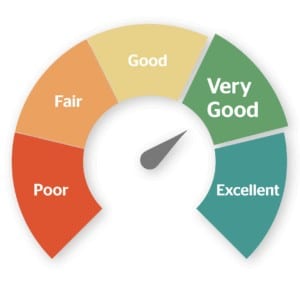Understanding Your Credit Score
Learn how credit scores work and how it can help you make better financial choices.
Your credit score is one of the most important numbers when it comes to your finances. A good score helps you get the best rates and terms on loans and credit cards, while a bad score can make it difficult to achieve your financial goals. Understanding how credit scores work is essential to maintaining a healthy financial outlook.
What is a credit score?
A credit score is a three-digit number that indicates your risk as a borrower to lenders. A high score means that you have been responsible with credit in the past, making you a good candidate for new financing. A low score means that you are a high-risk borrower who may be more likely to default.
Credit scores are calculated based on the information contained in your credit report. Each consumer has two credit reports, one from each of the two main credit bureaus in Canada – Equifax and TransUnion. Thus, each consumer also has two credit scores – a TransUnion credit score and an Equifax score.
Since the information contained in the two versions of your credit report will generally be the same or similar, your scores should be as well. You will never have an excellent TransUnion score but a bad Equifax score.
What makes a good credit score?

A good credit score is one that helps you borrow money at low interest rates. There are different credit scoring models. Fico scores are the most widely used.
Generally speaking, if you have a credit scoring range of 660 and above, most lenders consider that as good. If you have a credit score between 725 to 759 it’s considered very good, while a 760 and above is excellent credit.
Getting a good credit score isn’t rocket science. It’s common sense for the most part. There are several good credit behaviours you can exhibit to get a good credit score.
Credit Scores, Broken Down
The length of credit history matters a lot. If you’ve consistently demonstrated over many years that you can responsibly handle credit, this will affect your credit score in a positive way.
Credit in use or credit utilization is another important factor. This looks at your utilization rate or how much of your available credit limit you’re using. Aim to use less than 30 percent of your available credit on any one credit account and 30 percent of your total available credit across all credit accounts.
Types of credit also impact your credit score. Equifax and TransUnion will reward you for having different types of credit accounts, rather than just one type. Instead of having credit cards as your only type of credit, try to mix it up to lines of credit, car loans, and personal loans, too.
Be Selective
While it’s good to have a mix of credit accounts, you want to apply for credit selectively, too. Applying for a credit card once in a blue moon to save 20 percent off your next purchase might be okay, but if you’re applying for a new credit card every month, that’s when it can negatively affect your credit score.
Of course, it’s equally important to use credit accounts responsibly. That means paying your bills on time and in full. Late and missed payments can easily drag down your credit score from a good one to a poor one. Do your best to pay your bills on time. Set reminders in your calendar to pay your bills on time. You can also set it up so that your bills are automatically paid, so you don’t have to think about them.
Sometimes when you haven’t used a credit card for a while, you might consider closing it. Unless the credit card is charging you an exorbitant interest rate, it’s probably best to keep it open. Closing it could hurt your credit score, since the length of your credit history matters, too. When you close it, you reduce your length of credit history.
Recap on Credit Score Ranges
Credit scores range from 300-900 in Canada. According to Equifax:
- Credit scores from 660-724 are good
- Scores from 725-759 are very good
- Scores above 760 are excellent
If you have a score below 560, it’s considered poor. You may have difficulty getting approved for loans and traditional credit cards. When you do get approved, the interest rates may be much higher, making it more expensive to borrow money.
Keep in mind that different lenders often have different score requirements. A credit score of 640 may lead to a loan rejection from one lender. However, another may approve you for the same loan but charge a higher interest rate.
How are credit scores calculated?
Equifax scores
According to Equifax, there are five basic factors used to calculate a consumer credit score. Each factor has a certain “weight” as to how much it affects your score.
| Item | % | Factor |
|---|---|---|
| Credit History | 35% | This factor looks at the payment history on each account, as well as how many accounts you have overall. If you’ve missed payments by more than 30 days, it will negatively affect this factor. Accounts maintained in good standing with no missed payments will positively influence this criterion. |
| Credit in Use | 30% | This measures how much of your available revolving credit limit you currently use. If you have three credit cards each with a limit of $500, then your total available credit limit is $1,500. If you have a balance of $300 on one card, then you are using 20 percent of your total available credit. However, you are using 60 percent of the balance on that one card. In general, you only want to use about 30 percent of your available credit, both in total and on each account. |
| Credit age | 15% | Credit age looks at how long you’ve used credit. It looks at the “age” of each account. Having old accounts that you maintain over time in good standing improves this factor. |
| Public Records | 10% | This features the public records section of your report. If you have collection accounts, bankruptcies, foreclosures, or any other derogatory public records listed in your credit report, it will decrease your score. |
| Credit inquiries | 10% | The final factor looks at how many new credit applications you’ve had recently. Applying for too many credit cards and loans around the same time will hurt your score. This factor is measured by looking at the number of “hard inquiries” on your credit report, which happen anytime you authorize someone to check your credit. In general, you should space credit applications out by at least six months to avoid damaging your credit score. |
TransUnion scores
TransUnion does not expressly state weights of different factors used to calculate your score. However, they do list six factors that are typically used in scoring calculations:
- Payment history on loans and credit cards
- The current balance of each account
- How long those accounts have been open
- What types of credit you have (for example, a mortgage, credit card, and student loan)
- Amount of credit limit currently in use
- How often and how recently you’ve applied for new credit
Maintaining a good score
While credit scoring models may differ, these actions will always have a positive effect on your score.
Pay your bills on time
Be diligent about making your payments on time. Keep in mind that a payment missed by one day won’t be reported to the bureaus. Payments missed by more than 30 days will be. So, you can make the occasional mistake and your credit will not suffer. But falling behind on your bills will decrease your score.
Don’t max out your credit cards
Keeping your balances low is also great for your score while running up balances to their limits will hurt you. Ideally, paying off credit card charges in full every month is the best thing you can do for your score.
Keep accounts open and in good standing
You want to show creditors that you can maintain your accounts properly over time. So, if you have an old credit card, use it periodically to keep the account open. Be aware that unused accounts may eventually be closed by the credit card company.
Plan carefully for credit applications
If you know you want to buy a car next month, don’t apply for a credit card this month. Get your car loan first then wait a few months to apply for the credit card. This will ensure you get the best possible interest rate and terms on the loan. Then you can get the card later.
It’s important to note that if you apply for a mortgage or car loan and want to shop around for the best rate, the credit bureaus will group the inquiries and treat it as one inquiry. However, this does not apply to personal loans or credit cards.
Diversify your credit over time
As you get comfortable using credit, you should gradually take on different types of accounts. A mortgage is good debt and keeping it in good standing looks good on your credit. Having a few credit cards isn’t bad but having a mix of credit and loans is better.
Repair your Credit
This publication is designed to help those who have had credit problems in the past. Many people feel frustrated and worried that damaged credit history will remain with them forever or at least for a very long time. In almost every case there are strategies and concepts that one can use to put their credit back on track.
How does debt affect your credit score?
Having excessive credit card debt and other revolving debt is bad for your credit score. If you start to carry balances on multiple cards and those balances exceed 30 percent of the available limit on each account, your score will start to gradually decrease. The higher the balances go, the lower your score will drop.
Things get worse if you start to fall behind on your payments, and worse still if those accounts go into collections. It can be a slippery slope as you fall into financial hardship.
The good news is that you can turn things around. What’s more, nothing in credit lasts forever. Negative information only stays on your credit report for so long. Once the information expires, those penalties that are hurting your score disappear, too.
How getting out of debt may affect your score
It’s important to recognize that some debt solutions may negatively impact your credit score, particularly those that create public records. If you file for bankruptcy or a consumer proposal, it will be listed in the public records section of your credit report. This will hurt your score.
For this reason, you want to be proactive if you see that you’re facing challenges with debt. While bankruptcy can give you a fresh start, the damage it can cause to your credit may hold you back for some time.
Credit Score FAQs
Overspending can lead to inability to paying current credit card balances or other monthly bills. This can negatively affect your Payment History.
Credit bureaus see lines of credit as revolving debt, same as a credit card account. And since it’s seen as revolving debt, both your balance and credit card limit affect the credit utilization ratio. Furthermore, if your bank closes your line of credit before the term is up, your available credit shrinks. This also affects your credit utilization.
A credit inquiry, also called a credit check is when you or a company requests access to the information included in your credit report. Inquiries could be “soft” and “hard”. “Hard” credit checks can lower your credit score.
Since the CRA has a privacy policy in place, it doesn’t share information with Canadian credit bureaus. However, this doesn’t mean that tax debt can’t show on your credit report. Failing to address taxation issues with the CRA could affect your credit score. Usually, the CRA tries to resolve the issue with the taxpayer directly. But if they don’t receive communication from the taxpayer, they will escalate by putting a tax lien on your reports, garnishing wages and income, or involving a third party.
Marriage has no effect on your credit scores. Bureaus don’t include marital status in their records. However, getting married can affect your credit score when you star opening joint accounts, such as credit cards or mortgage.
Character, Capacity, Capital, Collateral and Conditions
- Character – the borrower’s credit history
- Capacity – refers to the applicant’s debt-to-income ratio
- Capital – how much money the borrower has
- Collateral – an asset that serves as a security for a loan
- Conditions – the purpose of the loan, the amount of the loan, and interest rates.
It usually depends on the lender, but to qualify for CMHC-insured mortgage, your minimum credit score needs to be at least 600. These are the new 2022 CHMC mortgage rules.
According to TransUnion the average credit score in Canada is around 650. However, the average credit scores could vary from province to province.
There are many reasons why your credit score might drop. This could include an application for new credit, credit limit usage, or a recent missed or late payment. Inaccurate information could also negatively affect your credit score.
If you have high credit card balances that you need to pay off, we can help. Talk to a trained credit counsellor today.






